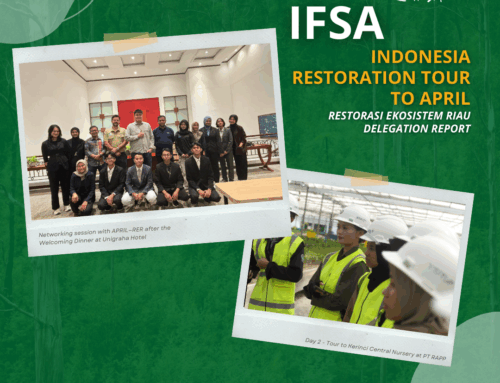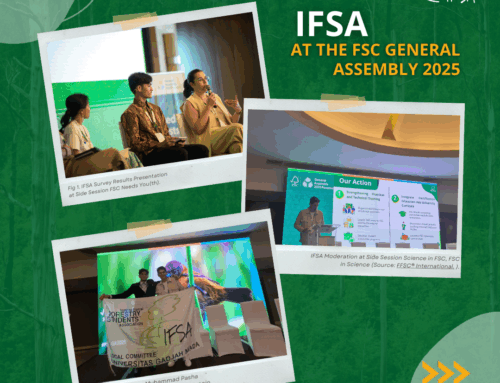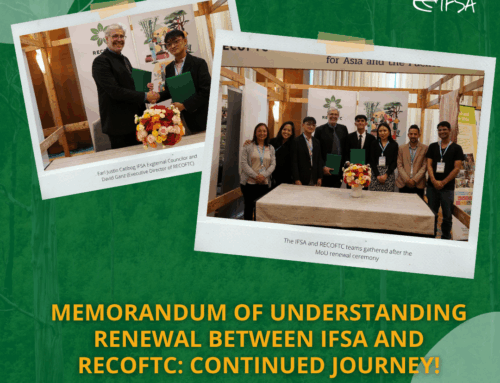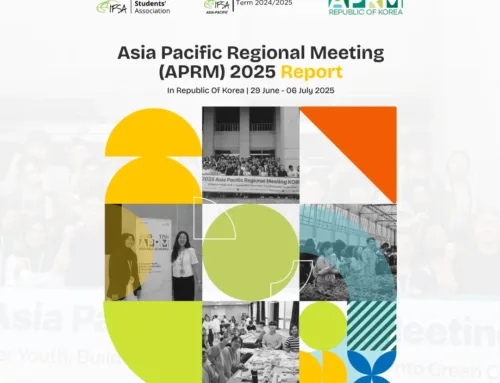After 3.5 years, what do we know about forest related employment and green jobs in the forest sector?
By Alex Bimbo Onatunji
What has been happening in the Joint EFI-IFSA-IUFRO Global Student Networking and Green Jobs in the forest sector (the project) since its inception? “It is an exciting time to summarize what we have done for the past 3.5 years and look at the way ahead” – was Janice Burns’ from the International Union of Forest Research Organizations (IUFRO) opening statement during her presentation at the project’s final event held virtually with about 50 participants from all over the world on April 7, 2022. The project, which kicked off in December 2018, set out to ask the big question – “Are today’s students in forest-related programmes prepared for society’s expectations of their roles as future managers and forest (policy) decision makers?”. The answers to this question were presented based on the project’s results regarding trends in forest-related education and employment, capacity development and networking, educational resources, and facts about forest-related employment.

Figure 1: A snapshot of the moderator and speakers during the event
Simone Massaro, the Executive Secretary of the International Forestry Students’ Association (IFSA), presented some of the results from the global survey on students in forest-related programmes and recent graduates, whereby over 1,000 responses were received from 90 countries globally. The survey focused on students and recent graduates: motivation to join forest-related programmes; career aspirations, perception and use of practical experience during study, subject-specific and general skills for employment, self-assessment of level of preparedness for the job market and perception of “Green Jobs”. Interestingly, beneficial work to society ranks highest while wages/salaries were lowest among the motivation to study forest-related programmes. Most of the students would like to find a job after their studies. The top 3 skills the respondents rank important are the ability to apply knowledge in a new environment, communication with experts, and teamwork. In terms of experience, forest-related internship/traineeship and volunteering rank high in terms of valuable experience.
“We see IFSA TreE-Learning as a platform for students to broaden their horizon”
Simone continued while presenting the progress made on the eLearning platform developed by students and for students to learn various topics to develop their generic skills such as CV writing. The project supported the platform through a paid traineeship. The platform is FREE OF CHARGE to use worldwide and has registered 1,000 unique visitors since its launch in September 2021. Gesche Schifferdecker, a communication expert from EFI Bonn, Germany, who served as the moderator for the event, was very impressed at how IFSA promotes peer-to-peer learning, complements what universities offer, and responds to the need of the job market.

Figure 2: Progress made on IFSA TreE-Learning platform since launch in September 2021.
“We gave an opportunity to these young students to polish their skills” – Juliet Achieng, a junior researcher in the project stated during her presentation. Juliet was sharing how 12 student assistants (some of which are IFSA members), helped in interviewing 31 forest-related employers from 5 countries and international employers. This is in a bid to get the perspectives of forest-related employers on the changes in employment in the forest sector in the past ten years, and a peek into the future up to 2030. Almost half of the employers reported an increase in the overall percentage of university graduates among their employees, and they will continue to do so. The first hires were mostly Master’s and PhD graduates, while Bachelor’s degree holders are often attracted recruited for internships. It is interesting to note that the skills and experiences that students and recent graduates ranked higher in the global student survey match the employers’ needs. Thus, an excellent match for both students’ and employers’ expectations. The collaborations between employers and higher education institutions have been a win-win situation for both parties, improving graduate quality. A scientific article is being prepared and will be available on the project’s website in the future.
“…this project really contributed in terms of a massive investment in human capital for the future, not just from the donors but the incredible amount of leveraging that it provided to bring all the students together to put in their time and ideas…” – said Janice as she gave vivid examples of the capacity building and networking initiatives that formed part of the project.

Figure 3: An overview of the Dare to Explore Traineeship programme
Janice seized the moment to thank the two incredible junior researchers (Lisa Prior and Juliet Achieng). They took on the roles and tasks of the project with support from many EFI and IFSA colleagues. The project also organized various workshops, webinars, and other capacity building events. With foresight, the project also supported 12 paid “Dare to Explore” traineeship positions in the science-policy interface and bridged the gap between employment and education. The option to work remotely was also available which made it possible to have Alina Lehikoinen to develop the IFSA TreE-learning platform. The trainees also shared their experiences through blogs and have made significant progress in their careers. A special testimonial video was also played during the event (see it on YouTube here).
You probably think that the success shared is already enough for the project. However, there is still more to know, as the project also supported the Young Scientist Initiative of IUFRO-EFI by providing 15 early-career researchers with mobility grants. Both the participants and the host institutions received this well, as they reported positive impacts on their personal and professional development. You can read the testimonials of the 2018 and 2019 editions and watch out for the next application round.
The green jobs project also supported the IFSA job talks series, and opportunities and information were shared through around 30 events worldwide. For example, it organized a side session as part of the International Conference on Forest Education in June 2021. One of the junior researchers, Juliet Achieng, was one of the lead authors for the book – “Building a Successful Forestry Career in Africa: Inspirational Stories and Opportunities”, other publications are in progress. The project also presented “How to create an effective Curriculum Vitae and Motivation Letter.” Participants are encouraged to join a network, take on leadership roles, build their capacities, build on the project work through existing data and communicate and share experiences regarding forest education and employment.
Juliet made the last presentation on preparing factsheets from the project to make it easier for readers to digest the critical information from the Experts’ workshop on “forest sector employment, green jobs, forest education,” global survey, and forest employers’ interviews. You can find the factsheets for students, universities, and policy makers on the project website.
The moderator concluded the webinar by asking what the most exciting results of the project were. The project partners responded that the number of females in forest education is rising. At the same time, there were no significant gender differences in the student’s motivation to pursue forest-related degrees and that a huge motivation by the trainees, volunteers, or simply taking part in the survey to be engaged in the project which needs to be harnessed. The chats were buzzingly with comments and questions from the participants showing their appreciation of the activities and asking more questions.
The event was closed, followed by an informal side session for participants to share what their organizations are planning in the next five years on the topics of forest education and forest-related employment or green jobs. Some important upcoming events are the 50th IFSS, Chile; IUFRO 2024 Congress, Sweden; Side events from the EFI-IFSA-IUFRO and IUFRO-IFSA task force at World Forestry Congress 2022; and Forest Europe Open House Seminar and What’s forest education up to in Africa and Europe? Insights into the regional assessments.
The project appreciates everyone that contributed to its success, including this final webinar. The generous funding by the German Federal Ministry of Food and Agriculture (BMEL) is hereby acknowledged. The webinar recording is available on YouTube (https://youtu.be/RkS-rzJGEfQ), and you can learn more about the project on its website: https://ifsa.net/efi-ifsa-iufro-project/.




